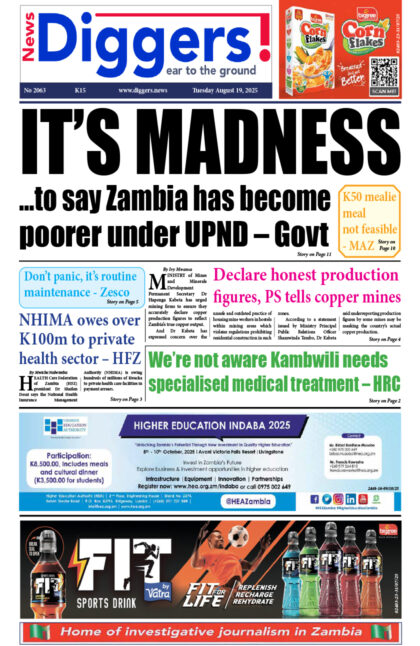Last week’s opinion piece reviewed the performance of Zambia’s 2024 national budget, highlighting that by mid-year, revenue collection fell short of set targets, and key economic sectors such as mining, agriculture, and energy underperformed. As we look forward to the announcement of the 2025 national budget, which is scheduled for Friday, 27th September 2024, this week’s piece focuses on key priorities for the budget.
Starting with the agriculture, the El Nino-induced drought in the last farming season had a severe impact on the sector. However, weather predictions for the upcoming season suggest that normal to above-normal rainfall is expected in parts of the country. As a result, the 2025 budget should allocate adequate funds to support the sector especially towards climate-resilient farming practices. These funds should not only help prepare the sector for potential flooding but also proactively address the challenges around low productivity.
Turning to the energy sector, the effects of prolonged drought have led to severe power shortages, with the country facing extended periods of load shedding. Zambia relies on hydropower for about 80 percent of its electricity generation, making the energy sector highly vulnerable to reduced water levels in dams.
Although improved water levels at the Kariba Dam during the rainy season are expected to boost electricity generation, there remains an urgent need to diversify the country’s energy mix. In the short to medium term, the 2025 budget should allocate adequate resources toward developing alternative energy sources, such as solar and wind, to reduce the country’s heavy reliance on hydropower. The 2025 national budget must also address the issue around low investment in the energy sector.
In the mining sector, while there are progressive frameworks to help boost production, such as the National Three (3) Million Metric Tonnes Copper Production Strategy by 2031 and the National Critical Minerals Strategy (2024-2028), these initiatives will require enough financial resources to be fully implemented. A necessary measure is undertaking extensive and thorough exploration of Zambian’s mineral wealth. Only then can significant investment be attracted into the mining sector. Additionally, the Minerals Regulation Commission – body corporate that will be regulating the mining sector – will demand adequate funding to become operational and effectively regulate the sector. Therefore, the 2025 budget should allocate more resources to ensure these initiatives are successfully implemented.
As a result of underperformance in key sectors, initiatives towards social protection have been compromised. For instance, prolonged drought experienced last season highlighted the vulnerability of many rural households because the majority depend on agriculture for their livelihoods. Thus, it is expected that the budget will allocate adequate resources to the Social Cash Transfer (SCT) programme and adjust the transfer value upwards to account for rising costs of living. Additionally, better targeting mechanisms should be implemented to ensure that the programme reaches those most in need. It is also expected that the lower PAYE tax band be adjusted upwards given the rising cost of living.
To support the above expenditure priorities, the 2025 budget must focus on improving domestic revenue mobilisation. This includes implementing stronger measures to curb illicit financial flows (IFFs), which continue to drain substantial revenue. Policy measures addressing IFFs should be clearly spelt out in the 2025 budget. Furthermore, the government should consider increasing excise duty on tobacco to boost revenue. In addition, there remains a need to strengthen VAT compliance and enforcement. This includes reviewing the processes by which companies claim VAT refunds. The ZRA should enhance the monitoring of VAT claims, especially in the mining sector which accounts for a significant share of all VAT refund claims. Furthermore, the withholding tax on gaming and betting activities should be reinstated at 20 percent, up from the current rate of 15 percent.
Overall, given the economic challenges faced in 2024, the 2025 national budget is expected to focus on strengthening economic resilience. This will require adequate investments in key productive sectors and support for the private sector, including small businesses, many of which have suffered reduced productivity due to prolonged load shedding. Additionally, the budget must ensure strong social protection measures to support the most vulnerable, particularly in rural areas where poverty levels are high. Balancing these priorities will be essential to driving a resilient economy— ensuring inclusive growth in 2025.
About the Author
Isaac Mwaipopo Heads the Centre for Trade Policy and Development in Zambia, providing guidance on trade policies, public finance, extractives, and legislative reviews. His extensive experience ensures the organization remains a key resource for developments in these areas.
























